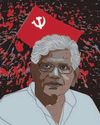The government’s carrot-and-stick approach in Kashmir may not work for long, especially since the carrots may or may not materialise

Article 370 of the Indian Constitution is as good as gone. And with it, Jammu and Kashmir’s separate constitution, its special status, and all symbols of its uniqueness among other Indian states.
Yet, at the Independence Day gathering at the Sher-i-Kashmir Stadium in Srinagar, Governor Satya Pal Malik chose to uphold one cherished Kashmiri symbol. He inspected the guard of honour on a jeep that flew two flags—the Indian tricolour on one side, and the red Kashmiri banner showing a white plough and three white vertical stripes on the other.
The red flag, much like the land it represents, has a violent history. Its origin dates back to July 13, 1931, when the police shot dead 21 people for protesting against the Dogra rule in Kashmir. Mourners picked up the blood-soaked shirt of a victim, tied it to a pole and hoisted it as the new flag of Kashmir.
Twenty years later, Sheikh Abdullah of the National Conference modified and adopted the banner as the state’s official flag. The plough, he said, symbolised the peasants who brought prosperity, and the stripes stood for the three geographical provinces that were integral to the state—Jammu, Kashmir and Ladakh. “This is a magnificent flag bequeathed to us by our struggle for freedom,” he said.
At the Sher-i-Kashmir Stadium, named after the Sheikh’s epithet, Governor Malik was at pains to tell Kashmiris that the voiding of Article 370 had not changed that legacy. Yes, Jammu and Kashmir was now a Union territory, and Ladakh had been carved out of it and made a separate UT. But the flag, apparently, was still a meaningful symbol—even though that, too, would be gone by October 31, when the two UTs will formally come into being.
Diese Geschichte stammt aus der September 01, 2019-Ausgabe von THE WEEK.
Starten Sie Ihre 7-tägige kostenlose Testversion von Magzter GOLD, um auf Tausende kuratierte Premium-Storys sowie über 8.000 Zeitschriften und Zeitungen zuzugreifen.
Bereits Abonnent ? Anmelden
Diese Geschichte stammt aus der September 01, 2019-Ausgabe von THE WEEK.
Starten Sie Ihre 7-tägige kostenlose Testversion von Magzter GOLD, um auf Tausende kuratierte Premium-Storys sowie über 8.000 Zeitschriften und Zeitungen zuzugreifen.
Bereits Abonnent? Anmelden

Themes Of Choice
As Savvy Investors Seek New Avenues, Thematic Mutual Funds Are Gaining Popularity

A golden girl
One of India's most formidable beauties passed away earlier this month. The odd thing is she would absolutely hate this obituary; she hated being written about and avoided publicity for all of her nine decades. Indira Aswani was 93 when she died. But anyone who encountered her, even briefly, was in such awe of her grace and poise, and one could not but remember her forever.

The interest in wine is growing delightfully in India
The renowned British wine writer and television presenter Jancis Robinson, 74, recently came to Delhi and Mumbai to reacquaint herself with India's wine industry. This was the Robinson's fourth visit to India; the last one was seven years ago. On this trip, Robinson and her husband, restaurateur Nicholas Lander, were hosted by the Taj Hotels and Sonal Holland, India's only Master of Wine.

United in the states
Indian-Americans coming together under the Democratic umbrella could get Harris over the line in key battlegrounds

COVER DRIVE
Usage-driven motor insurance policies offer several benefits

GDP as the only measure of progress is illogical
Dasho Karma Ura, one of the world's leading happiness experts, has guided Bhutan's unique gross national happiness (GNH) project. He uses empirical data to show that money cannot buy happiness in all circumstances, rather it is family and health that have the strongest positive effect on happiness. Excerpts from an interview:

India is not a controlling big brother
Prime Minister Tshering Tobgay considers India a benevolent elder sibling as the \"big brotherly attitude\" is happily missing from bilateral ties. He thinks the relationship shared by the two countries has become a model of friendship not just for the region, but for the entire world. \"India's attitude is definitely not of a big brother who is controlling and does not allow the little brother to blossom and grow,\" says Tobgay in an exclusive interview with THE WEEK.

Comrade with no foes
Lal Salaam, Comrade Yechury-you were quite a guy!

Pinning down saffron
In her first political bout, Vinesh Phogat rides on the anti-BJP sentiment across Haryana

MAKE IN MANIPUR
Home-made rockets and weapons from across the border are escalating the conflict